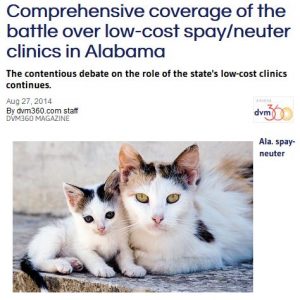Module 4: The Case of the Spay-Neuter Skeptic
Concerns about Competition
Local veterinary practices sometimes worry that when a low-cost clinic opens nearby it will affect their business by luring away paying clients. In some locations, low-cost spay-neuter clinics have been forced to close. Some states prohibit shelters or nonprofit clinics from providing veterinary services to the public. Acrimony peaked in Alabama with an attempt to ban all spay-neuter clinics from the state and to threaten the licenses of veterinarians who worked at nonprofit clinics.
Controversy Regarding Low-Cost Clinics

Judge Recommends Alabama Spay-Neuter Veterinarian Be Found Not Guilty After Administrative Hearing
By Julie Scheidegger
Dr. Margaret Ferrell is touted as “one of the best surgeons he has seen in 42 years” by expert witness, while dissenters continue to claim non-profit, low cost clinics are unfair competition that provide substandard care.
[Dr. Bushby] contradicted the accusations of the board and its expert witnesses, saying Ferrell is well within the standard of care in the time she spends on a surgery, physical exams and post-operative care. “What Dr. Ferrell does is extremely high quality and exceeds national standards,” he said, adding, “Dr. Ferrell’s methods are very safe and used all over the country. Dr. Ferrell is not dangerous.” Read more . . .
Despite these conflicts, there is growing recognition that a variety of factors, including fast-rising veterinary costs, are contributing to a widening gap in access to veterinary care. The University of Tennessee’s Veterinary Social Work program and the Access to Veterinary Care Coalition have stated:
“There are more than an estimated 23 million pets living with families that cannot financially provide for their veterinary care. When these pets become ill or get injured, their families have limited options to help them. Their unmet needs mean unnecessary morbidity and mortality, and an unacceptable threat to public health.”
The Access to Veterinary Care Coalition, which describes itself as “a diverse group of for-profit and nonprofit veterinary services providers, animal welfare and social services professionals, and educators,” published a national study to “identify barriers that households face, as well as best practices among those delivering veterinary care to underserved pet owners.” Learn more about this multi-disciplinary approach to solving the needs of pets and the people who love them, as well as efforts to decrease conflict around the provision of veterinary care.
Practitioners offering low-cost services to the public should be prepared to explain the rationale for such services. A recently published national survey, Characteristics of clients and animals served by high-volume, stationary, nonprofit spay-neuter clinics, confirmed what HQHVSN staff and supporters have long suspected, that HQHVSN clinics predominantly provide care to underserved populations and animals lacking even the most basic veterinary care, even when income restrictions were not used. The study found that most clients earned less than $30,000 per year and that the vast majority of patients had never been to a veterinarian before or received a rabies vaccine. A quarter of female pets had already produced at least one litter.
Rather than serving as competition for private practices, HQHVSN clinics are providing essential services that pets might not otherwise receive. In addition to the impact of spay-neuter on reducing pet overpopulation and shelter euthanasia, these HQHVSN clinics meet a critical societal need and contribute to the advancement of One Health.

